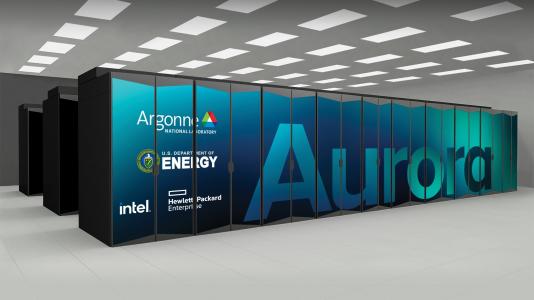
The U.S. Department of Energy’s (DOE) Innovative and Novel Computational Impact on Theory and Experiment (INCITE) program is now accepting proposals for high-impact, computationally intensive research campaigns in a broad array of science, engineering and computer science domains. Proposals must be submitted between April 10 and June 16.
The INCITE program offers researchers the opportunity to pursue transformational advances in science and technology through large allocations of computer time and supporting resources at the Argonne Leadership Computing Facility (ALCF) and the Oak Ridge Leadership Computing Facility (OLCF). The ALCF and OLCF are DOE Office of Science user facilities located at DOE’s Argonne National Laboratory and Oak Ridge National Laboratory, respectively.
“DOE’s leadership-class supercomputers are world-leading scientific tools, and the INCITE program provides researchers entry to these valuable resources to the open science community,” said Katherine Riley, ALCF director of science. “We are proud to say that INCITE can support the most ambitious, long-term research campaigns.”
Open to researchers around the world from academia, industry and government agencies, the INCITE program will award up to 60% of the allocable time on DOE’s leadership-class supercomputers: the OLCF’s Frontier, a 1.1 exaflop HPE Cray EX machine, and ALCF’s Polaris, a 25 petaflops HPE Cray machine, and Aurora, a peak 2 exaflops Intel-HPE Cray EX system. Proposals may request periods of performance from one to three years.
In addition to seeking traditional simulation-based projects, the call for proposals is open to projects that involve applications in areas of data science, including data-intensive computing, and machine learning. Crosscutting proposals targeting the convergence of simulation, data and learning are also encouraged.
“With the 2024 INCITE call, we are looking to support the most computationally demanding projects in the world, including modeling, data and machine learning — projects that would not be possible without the resources of the leadership computing facilities,” said Bronson Messer, OLCF director of science. “We’re excited to enable researchers to push the frontiers of discovery for breakthroughs in science and engineering.”
All proposals undergo a peer review process to identify projects with the greatest potential for impact and a demonstrable need for leadership-class systems to deliver solutions to grand challenges. Additionally, applications will be evaluated for computational readiness to determine how effectively each proposed project will use the requested systems.
INCITE is once again committing 10% of allocable time to an Early Career Track in 2024. Since 2022, the program has sought to encourage the next generation of high performance computing researchers by focusing on principal investigators (PI) who have earned a doctorate degree within the last 10 years. Researchers who earned their Ph.D. on or after December 31, 2013, and who have not served as PI on a previous INCITE project are eligible. Applicants’ project proposals will go through the regular INCITE Computational Readiness and Peer Review process, but the INCITE management committee will consider meritorious projects in the Early Career Track separately.
To submit a proposal or read additional details about the requirements, visit https://www.doeleadershipcomputing.org/proposal/call-for-proposals/. Proposals will be accepted until 8 p.m. EDT on Friday, June 16. Awards are expected to be announced in November.
For more information on the INCITE program and a list of previous awards, visit www.doeleadershipcomputing.org.
Preparing for INCITE
The INCITE program will host informational webinars on April 25 and May 2. Register now:
April 25 Webinar: https://2024-incite-proposal-writing-1.eventbrite.com
May 2 Webinar: https://2024-incite-proposal-writing-2.eventbrite.com
The Argonne Leadership Computing Facility provides supercomputing capabilities to the scientific and engineering community to advance fundamental discovery and understanding in a broad range of disciplines. Supported by the U.S. Department of Energy’s (DOE’s) Office of Science, Advanced Scientific Computing Research (ASCR) program, the ALCF is one of two DOE Leadership Computing Facilities in the nation dedicated to open science.
Argonne National Laboratory seeks solutions to pressing national problems in science and technology. The nation’s first national laboratory, Argonne conducts leading-edge basic and applied scientific research in virtually every scientific discipline. Argonne researchers work closely with researchers from hundreds of companies, universities, and federal, state and municipal agencies to help them solve their specific problems, advance America’s scientific leadership and prepare the nation for a better future. With employees from more than 60 nations, Argonne is managed by UChicago Argonne, LLC for the U.S. Department of Energy’s Office of Science.
The U.S. Department of Energy’s Office of Science is the single largest supporter of basic research in the physical sciences in the United States and is working to address some of the most pressing challenges of our time. For more information, visit https://energy.gov/science.